Chimneys and flues: Don't forget the neighbours!
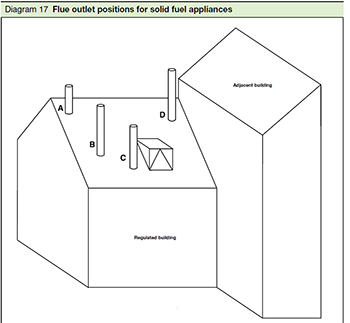
Approved Document J outlines the precautions needed to ensure that smoke and gases from appliances can be safely discharged. Diagrams 17 and 18 highlight the outlet heights needed in relation to traditional roofs and easily ignited coverings such as thatch and shingles.
In general, outlets need to be at least 600mm above the ridge where they are on or within 600mm of the ridge itself (A). If the flue or chimney is elsewhere its height needs to be lifted until the termination point is 2300mm from the roof covering when measured horizontally and at least 1000mm high or at least as high as the ridge (B).
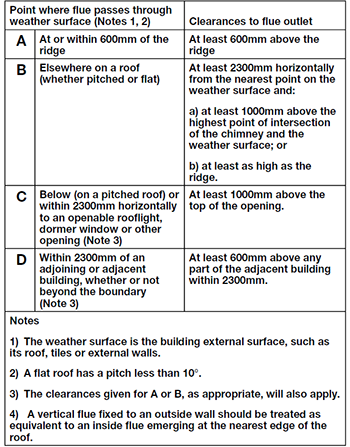
What have the neighbours to do with it..?
There are also requirements if there are other buildings within 2300mm of the ‘regulated building’.
So adjoining buildings less than a drive width away from the chimney also impose a requirement to raise the outlet at least 600mm above any part of the adjoining building (D).
This could cause problems on sloping sites or on infill developments with the chimney or flue needing to be higher than normal. Don’t forget that Approved Document A also places a structural requirement for chimney height to be no more than 4.5 times its width (2D1 and Diagram 20).
So the higher a chimney, the larger it needs to be. There is also a requirement (AD J 2.8) for flues to be at least 4.5m measured from the highest point of air entry – which could be the top of a fireplace opening. For bungalows this means that termination may be significantly higher than 600mm above the ridge.
Further information
Building Regulations Part J (Wales)
Guide to installing solid fuel stoves
Please Note: Every care was taken to ensure the information was correct at the time of publication. Any written guidance provided does not replace the user’s professional judgement. It is the responsibility of the dutyholder or person carrying out the work to ensure compliance with relevant building regulations or applicable technical standards.
This article was reviewed and updated on 10 August 2023
Sign up to the building bulletin newsletter
Over 48,000 construction professionals have already signed up for the LABC Building Bulletin.
Join them and receive useful tips, practical technical information and industry news by email once every 6 weeks.
Subscribe to the Building Bulletin
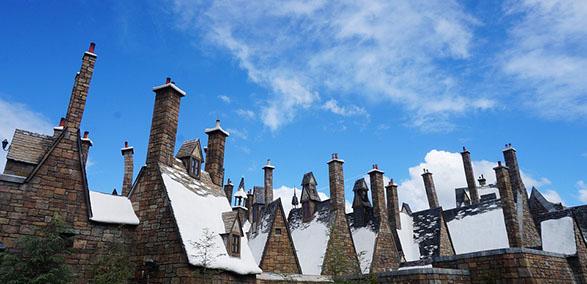
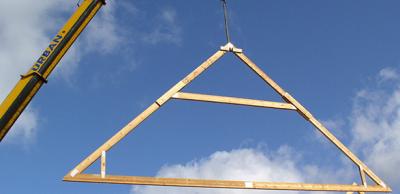
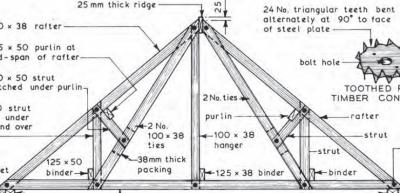
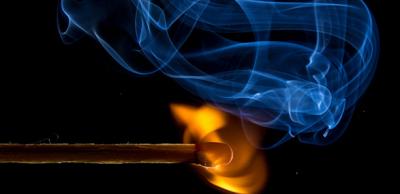
Comments
Wood burners
Submitted 4 years 6 months ago
Thanx Mick.
Reply
Submitted 4 years 1 month ago
Relevant dimensions are indicated in the table shown in the article and will depend on the height above the opening together with the horizontal distance. We would advise you to discuss the matter with your local authority for further information.
Kind regards,
LABC
Reply
Submitted 4 years 1 month ago
Apologies for the delay getting back to you on this one. Here's the reply from our technical team:
Relevant dimensions are indicated in the table shown in the article and will depend on height above the opening together with the horizontal distance. We would advise you to discuss the matter with your local authority for further information.
Kind regards
Julie, LABC
Log burner
Submitted 4 years 1 month ago
Log burner on a neighbour's wall
Submitted 3 years 5 months ago
LABC response
Submitted 3 years 4 months ago
Protection of building J4.
Combustion appliances and fluepipes shall be so installed, and fireplaces and chimneys shall be so constructed and installed, as to reduce to a reasonable level the risk of people suffering burns or the building catching fire in consequence of their use.
Section 2 of the guidance deals with appliances burning solid fuel, with a rated output up to 50kW and in particular the guidance in paragraphs 2.32 and 2.33 and that contained in diagram 30 (inserted below for information) is relevant.
page 42 of Approved Document J | Part J - Combustion appliances and fuel storage systems
https://www.planningportal.co.uk/info/200135/approved_documents/72/part_j_-_combustion_appliances_and_fuel_storage_systems
Best,
LABC team
Wood burning stove
Submitted 3 years 4 months ago
LABC response
Submitted 3 years 3 months ago
Thank you for your enquiry. Relevant dimensions will depend on the flue termination height above the adjoining building together with the horizontal distance as indicated by Point D in the table and diagram of the article. We are unable to comment on individual situations and would advise you to discuss the matter with your local authority for further clarification.
You can find the contact details of the relevant local authority by entering your postcode in the search box at the top right-hand side of our website.
Best,
LABC team
Flue Living Fireplace
Submitted 3 years 4 months ago
Any help would be appreciated. My parents' neighbours have installed a 'living fireplace' with a flue located about halfway up the side wall of their property. It is positioned directly between two windows of my parents property (with a distance of about 2 and a half metres between the windows of my parents' home and the flu). Is this legal?
Best wishes,
Tim
LABC response
Submitted 3 years 3 months ago
Thank you for your enquiry. The article highlights guidance given for the termination of flues serving solid fuel appliances within Approved Document J which can be viewed by following the link above. Relevant dimensions will depend on the height of the flue termination above the adjoining building together with the horizontal distance as indicated by Point D in the table and diagram of the article. We are unable to comment on individual situations and would advise you to discuss the matter with your local authority for further clarification.
You can find the contact details of the relevant local authority by entering your postcode in the search box at the top right-hand side of our website.
Best,
LABC team
Add new comment